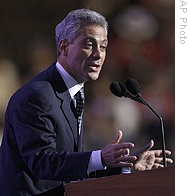voa标准英语2008年-Election Triggers Leadership Changes in US Cong(在线收听)
 |
| Rahm Emanuel (file photo) |
Congressman Emanuel's acceptance of President-elect Obama's offer to become chief of staff means the fourth highest position in the Democratic leadership will be open.
Like Mr. Obama, Emanuel is from Illinois and has been a close friend of the president-elect, who weighed personal considerations before accepting the job. His Illinois congressional seat will be subject to a special election.
A top policy adviser to former President Bill Clinton in the 1990s, Emanuel is a tough political operator and was a chief architect of electoral victories in 2006 that put Democrats in the majority in the House.
Strengthened by election wins that widened Democratic majority control, House Speaker Nancy Pelosi and Majority Leader Steny Hoyer will retain their posts in the new 111th Congress.
For Republicans, losses in two straight election cycles have sparked a wave of internal criticism, and suggestions that fresh leadership is required.
Thomas Mann from the Brookings Institution says Republicans may be facing a long period in the minority.
"They have had two rough elections in a row and could end up having a third or fourth before they get themselves straightened out," he said.
In other developments, Missouri Representative Roy Blunt, the House Minority Whip [responsible for generating Republican votes] announced he will relinquish the post.
Blunt endorsed as his replacement his deputy, Virginia Representative Eric Cantor, who has played an increasingly prominent role as a strong conservative spokesman for Republicans.
While House Minority Leader John Boehner is expected to keep his post, there have been suggestions that a change in the top House Republican position should also be considered in the wake of Republican election losses.
A contest is underway for the number three House minority post after Florida Representative Adam Putnam announced he would step down as Chairman of the House Republican Conference.
Two of the strongest conservative voices in the House, Jeb Hensarling of Texas and Indiana's Mike Pence, were among those reported competing for that post.
Political analyst Norman Ornstein of the American Enterprise Institute says this and other developments point to a shift to the political right in the House of Representatives.
"It's a very strong group of ardently free-market, strongly socially conservative people who are probably going to be reflected at other levels of the leadership as well," he said.
Also facing challenges are National Republican Congressional Committee Chairman Tom Cole, who faced criticism over weak Republican fund raising, and Representative Thaddeus McCotter, for chairmanship of Republican Policy Committee.
The coming weeks will bring other changes in the House as jockeying occurs among majority Democrats for chairmanships of key congressional committees, and among Republicans for the ranking minority slots on various panels.
Analyst Norman Ornstein says one of these potential changes, in which Oversight and Government Reform Committee Chairman Congressman Henry Waxman is reported to be challenging veteran House lawmaker John Dingell to lead the House Energy and Commerce panel, could prove politically divisive for majority Democrats.